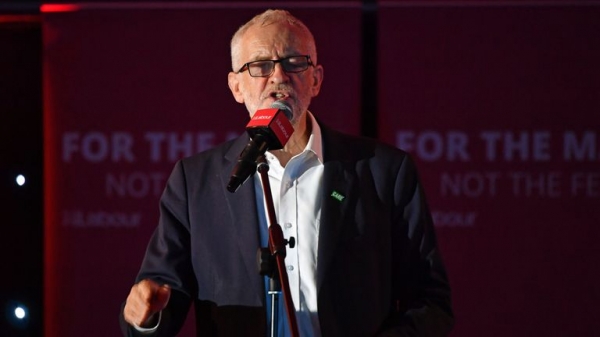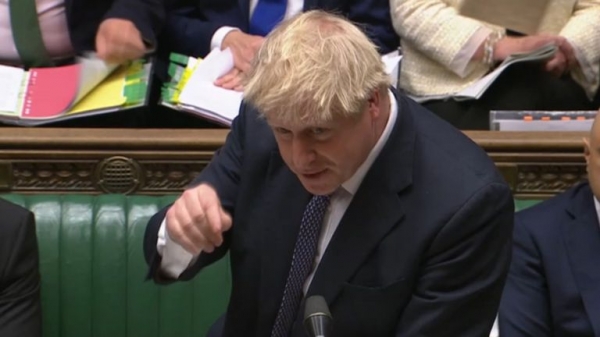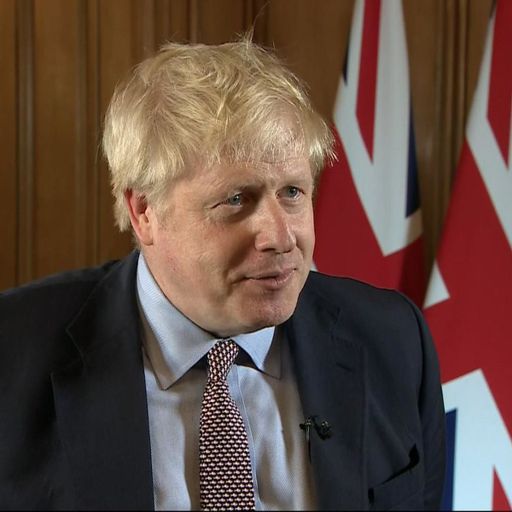Fear is clouding judgement of Boris Johnson’s opponents over snap election
There are plenty of scenarios where the rejection of an election explodes in the face of those who most want to reverse Brexit.

Boris Johnson’s opponents are playing into his hands.
If there is one sentence which has cropped up again and again with opposition MPs over the past 24 hours, since Boris Johnson made his latest election gambit, it’s that they cannot, under any circumstances “give Boris what he wants.”
This is an interesting point of view and it reveals something about the success this Number 10 has had in narrating its own story: that despite abundant evidence to the contrary, many believe this Downing Street to be uniquely conniving, uniquely able to think several moves ahead. Anything they might suggest then, must be resisted.
I would wager that that fear is now clouding the judgement of those who oppose him. That resisting this move might be the very thing which delivers what he most wants: Brexit and soon.
There are plenty of scenarios where the rejection of an election explodes in the face of those who most want to reverse Brexit. Indeed, I would argue it’s easily the most likely outcome.
Boris Johnson and his government clearly do not expect the EU to accede to his deeply held wish for a shorter extension.

The prime minister’s request for an election is a tacit acceptance of a January date, something his Chancellor Sajid Javid acknowledged more openly in a series of interviews this morning.
However, his opponents are gallantly doing all they can to prove the prime minister right and give him what he most dearly desires.
The prime minister’s arguments, in public and private to European leaders, is that this parliament will never resolve the Brexit crisis; that its every instinct is to delay, to defer any decision where it can and thus inadvertently infect Britain’s political instability into the wider European ecosystem.
His argument is that the only way to make parliament play ball is to stop playing nice.
What about the last 24 hours has proved his thesis wrong? Opposition leaders not only seem to have rejected an election but also offered no alternative strategy in its stead.

There are instead multiple plans; to bring the Withdrawal Agreement Bill, to bring back Theresa May’s deal, to tie up to the WAB in knots, all working in parallel, none with a critical mass.
The one thing they have in common is that they would all take time. It is certain that if an election is rejected then parliament will be little further forward by mid-November. Go beyond early November and it will be too late to call an election this year.
In reality, I suspect that is tantamount to a rejection of an election for the whole of the proposed new extension period, through to 31 January. There will be very little appetite for an election called in say, December, to be conducted in the immediate run-up to Christmas and over the New Year break.
In reality, if the deadlock persisted, the new election would have to be called in January and held at some point in early 2020 which would mean, you guessed it, another extension.
It is easy to see and hear Emmanuel Macron’s arguments flow. Though he remains relatively isolated, it is not impossible that they prevail.

Sky Views: Lewis Goodall
An election will be cleansing and make Brexit resolution easier to achieve
The nightmare scenario for Remainers and Labour must be that they do and that the EU offers a much shorter extension, time only for a ratification.
Labour MPs, in the absence of any other strategy, or anything else to vote for, would peel away and vote not only for the Withdrawal Agreement but for a version which was unamended, so as to ensure speedy ratification.
Even if they did not peel away, if the extension were only til the end of November, without any so-called flextension to the end of January built in, then the Benn Act will have been exhausted and there will be nothing to compel the prime minister to ask for another extension.
This is still, I think, unlikely but it is not impossible. There has been much speculation of contact between the British and French governments in recent days, including before Mr Johnson made his election move.
It is not impossible that Mr Macron, who is keen to establish French pre-eminence within the European bloc, a project assisted by Britain’s departure, is working in concert with Mr Johnson.

There are other ways the curious Remainer rejection of the election plays into Mr Johnson’s hands too. There is no convincing scenario for a reversal of Brexit that does not include a general election and change of government along the way.
Likewise, there is little chance of a Labour government if Mr Johnson succeeds in his endeavours of passing his deal, which can only be prevented by an election soon. As I have written before, with nothing offered in its stead, the deal emits a powerful political gravity. Sooner or later, it will probably pass.
And yet both Remainer forces and Labour appear set to reject the one thing which might realise their separate but interwoven objectives: a new referendum and a Labour government.
Partly because, as I wrote above, they fear that if Johnson wants it, it must be, by definition, a bad idea.
But of course, the trick of politics, as in any battle, is to turn your opponent’s strategy against them. That is what happened to Mrs May in 2017. It is what Boris Johnson’s opponents could do now.

Brexit: The uncomfortable truth about Boris Johnson's deal
There is another way in which the motives of those around Mr Johnson are considered so dark, so Voldemort like, that they cloud the judgement of many.
It is assumed that nothing he says can be of value or legitimate or honestly felt. There are many reasons to doubt the veracity of many of the statements which flow from Downing Street.
But reading the letter which Mr Johnson sent last night, a particular passage struck me as being entirely sincerely meant: “Given this situation, we must give the voters the chance to resolve this situation as soon as reasonably possible before the next deadline of 31 January. We cannot risk wasting the next three months then this farce being replayed with yet another delay in January 2020 and still no way for the country to move on.
“This parliament has refused to take decisions. It cannot refuse to let the voters replace it with a new Parliament that can make decisions.”
It’s hard not to conclude that he’s correct.
Previous article
PM to ‘keep asking’ for election – even if Labour says no again
Next article
PM sent to ‘naughty step’ by DUP over Brexit deal
